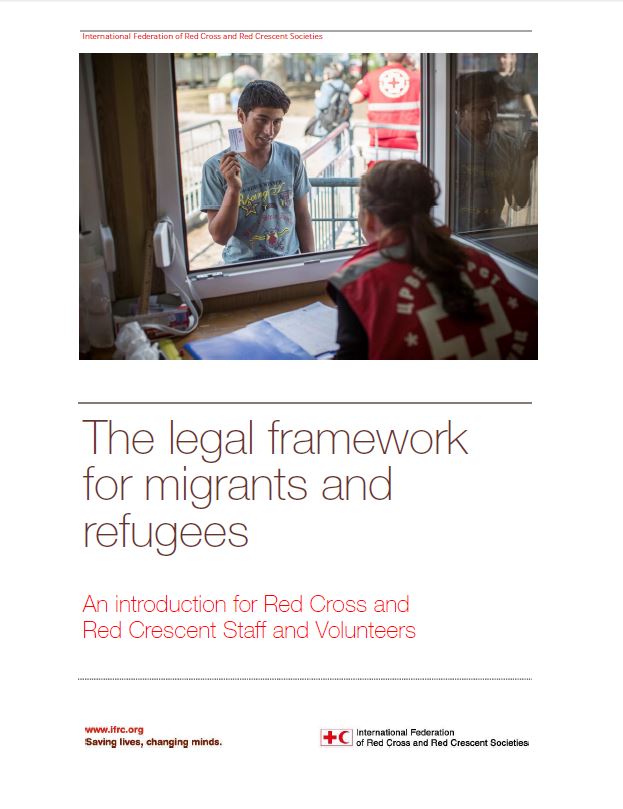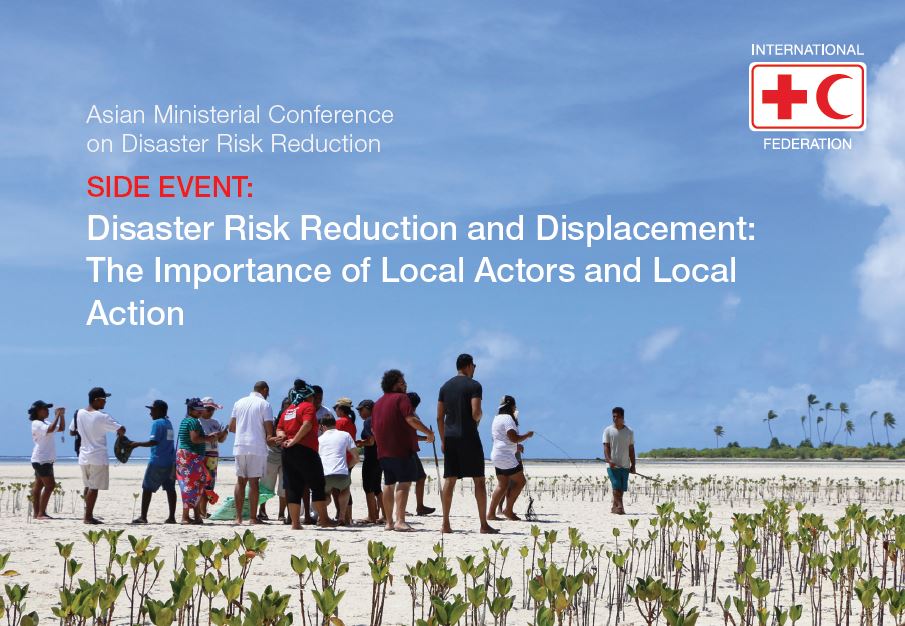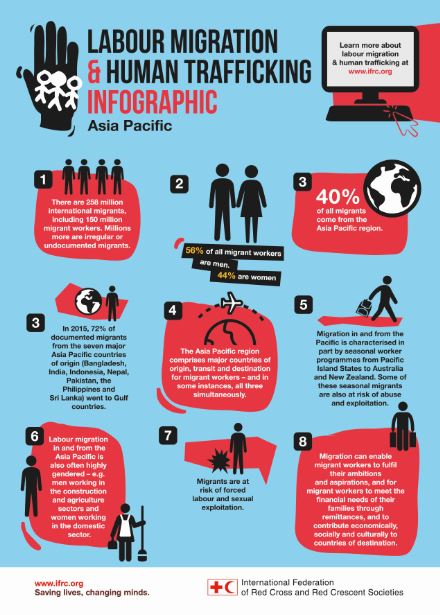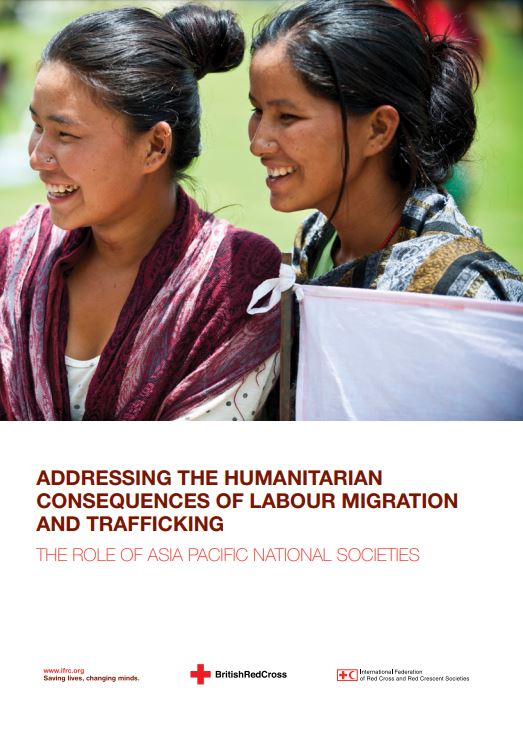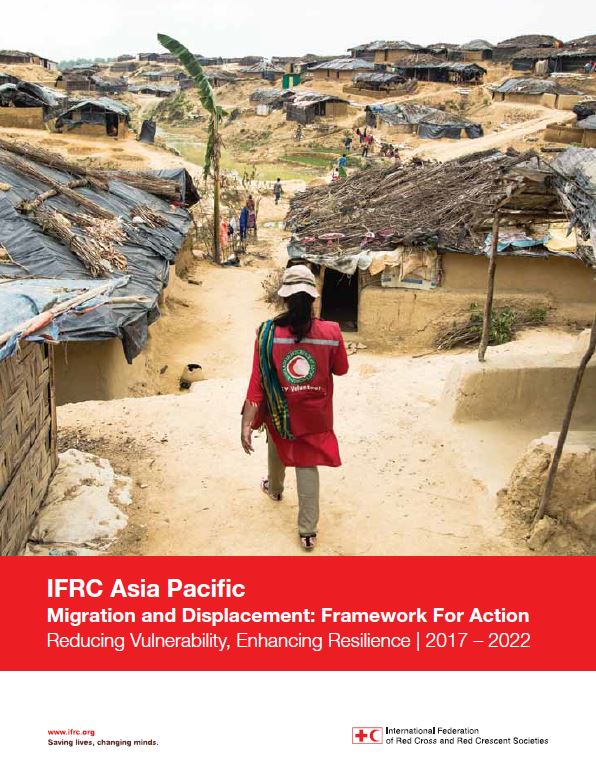Addressing the Humanitarian Consequences of Labour Migration and Trafficking: The Role of Asia Pacific National Societies
This Note provides guidance for the assistance, protection and humanitarian diplomacy activities of Red Cross and Red Crescent National Societies in the Asia Pacific region in the context of labour migration and trafficking. The Note builds upon existing International Red Cross and Red Crescent Movement policies, guidance and commitments relevant to migration and displacement. The Note also contains a collection of case studies of existing initiatives by Asia Pacific National Societies, demonstrating the strength and diversity of National Societies’ activities related to labour migration and trafficking.
The Note is designed to support the existing initiatives of Asia Pacific National Societies, as well as provide guidance for those National Societies considering new initiatives in the context of labour migration and trafficking. The Note will be useful to National Societies across all departments – from leadership to migration, disaster management, health, shelter, Restoring Family Links (RFL), welfare and beyond. The note will also be useful for representatives from governments, regional institutions, academia, civil society organisations and United Nations (UN) agencies to deepen their understanding of the core mandate and strengths of Asia Pacific Red Cross and Red Crescent National Societies in the context of labour migration and trafficking.
![]()
IFRC Asia Pacific Migration and Displacement: Framework for Action [Low Resolution]
The IFRC Asia Pacific Framework for Action provides an overview of the aims and objectives of IFRC support to Asia Pacific National Societies in engaging in the context of migration and displacement, to be achieved over a 6-year timeframe, from 2017 to 2022.
This document provides a contextualised, regional focus for the IFRC Global Migration Strategy 2018 – 2022. It is available for download in high-resolution and low-resolution versions.
![]()
IFRC Asia Pacific Migration and Displacement: Framework for Action – Reducing Vulnerability, Enhancing Resilience | 2017 – 2022
The IFRC Asia Pacific Framework for Action provides an overview of the aims and objectives of IFRC support to Asia Pacific National Societies in engaging in the context of migration and displacement, to be achieved over a 6-year timeframe, from 2017 to 2022.
This document provides a contextualised, regional focus for the IFRC Global Migration Strategy 2018 – 2022. It is available for download in high-resolution and low-resolution.
![]()
Bali Process Government and Civil Society Roundtable | 14-15 May 2018 | Bangkok, Thailand
On 14 – 15 May 2018 Australian Red Cross and the IFRC, with the Australian and Indonesian governments, co-hosted the first regional Government and Civil Society Roundtable as part of the State-led Bali Process. Representatives from six National Societies (Australian Red Cross, Bangladesh Red Crescent, Maldivian Red Crescent, Nepal Red Cross, Pakistan Red Crescent, and Philippine Red Cross), ICRC and IFRC were joined by representatives from 13 governments and national and regional Civil Society Organisations (CSOs) and international agencies. The meeting was a significant success, with strong engagement between RCRC Movement partners and governments, and a commitment made by the Bali Process co-Chairs, namely the governments of Australia and Indonesia, to follow through on outcomes and recommendations.
After the end of two days of engaging and frank discussion, it was agreed by participants that:
Effective cooperation between governments and CSOs is key to preventing and addressing human trafficking and serious forms of labour exploitation, including the importance of:
- supporting CSOs as an invaluable asset in identification and protection processes and ensuring clear guidelines and operating procedures to clarify roles and responsibilities;
- formalising national coordination mechanisms to lay the foundation for effective protection; and
- ensuring coordination mechanisms are operationalised through referral pathways, SOPs, regular meetings and evaluations
Referring to the root causes of trafficking and labour exploitation, governments and CSOs can collaborate to:
- increase capacity for knowledge building sharing about why people experience human trafficking; and
- build opportunities to form both formal and informal networks to increase pathways for identification and referrals.
On the challenges of effective collaboration:
- Governments play a convening role to bring governments and CSOs together to share information and good practice; and
- develop a shared understanding of common goals, focused on shared mandates and objectives while recognizing different roles, mandates and priorities.
Examples of good practices includes:
- Innovative approaches to address shared challenges
- Strong networks
- Recognition of the strengths that CSOs bring to identification and protection.
- Participants agreed to share contact details to facilitate strengthened connections and relationships and build effective pathways for information and knowledge sharing.
![]()
Cross-regional Conference on Labour Migration (Asia Pacific – Middle East) | 20-21 June 2018 | Bangkok, Thailand
The Red Cross Red Crescent Conference on Labour Migration was held in Bangkok, Thailand from 20 to 21 June 2018, bringing together Red Cross and Red Crescent National Societies and external partners to discuss recent developments and exchange knowledge and experience under the theme of humanitarian assistance, protection and advocacy for migrant workers. This includes those particularly most at risk including women and children.
The conference was co-facilitated by IFRC Asia Pacific and IFRC Middle East North Africa in partnership with the Australian Red Cross, Qatar Red Crescent Society and ICRC and see the attendance of leadership and technical focal points from Asia Pacific and Middle East National Societies.
Publication:
Conference materials:
Reference documents:
- Concept note
- IFRC Asia Pacific Case Studies: Health and Care for Migrants and Displaced Persons:
- IFRC Global Strategy on Migration
- IFRC Policy on Migration
- Movement Call for Action on Migration
- Resolution 3: Migration: Ensuring access, dignity, respect for diversity and social inclusion
- IFRC Asia Pacific Migration and Displacement: Framework For Action Reducing Vulnerability, Enhancing Resilience | 2017 – 2022
Communications documents:
- Infographics: Asia Pacific | Middle East and North Africa
Click here to visit the conference official page.
![]()
Asia Pacific Migration Network Annual General Meeting | 18-19 June 2018 | Bangkok, Thailand
The Asia Pacific Migration Network (APMN), in collaboration with IFRC and the ICRC will host an Annual General Meeting from 18-19 June in Bangkok, Thailand. This Meeting will complement the Red Cross Red Crescent Conference on Labour Migration, to be held from 20-21 June, in Bangkok, Thailand.
The Annual General Meeting will provide a forum for Asia Pacific National Societies to share information, discuss challenges and successes, identify opportunities and chart a common way forward in addressing humanitarian needs in the context of migration in and from the Asia Pacific region.
The Asia Pacific Migration Network (APMN) is a regional forum established by agreement between the 17 Red Cross and Red Crescent National Societies (NS) that gathered in Bangkok in December 2012 for the Asia Pacific Migration Workshop. The Australian Red Cross and the Maldivian Red Crescent are the current co-chairs of the Network, and the Australian Red Cross hosts the Secretariat for the APMN.
Objectives of the Annual General Meeting
The objectives of the 2018 APRMN Annual General Meeting are to:
1. Strengthen the APMN as a platform for ongoing collaboration and dialogue between Asia Pacific National Societies
2. Enhance understanding of the Movement’s approach to migration
3. Deepen and share understanding of the complexity of migration issues across the region and work towards practical action
4. Learn from one another, and to deepen relationships between National Societies on migration
5. Identify gaps and opportunities related to addressing the humanitarian concerns related to migration
6. Build on the outcomes raised by the 6 National Societies that participated in the 2018 APMN peer to peer learning at Australian Red Cross
Meeting documents:
![]()


